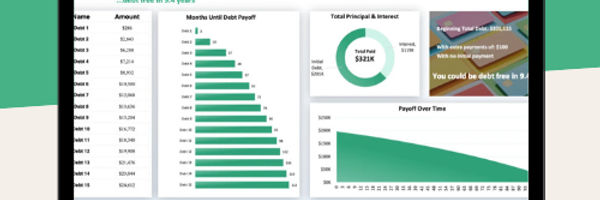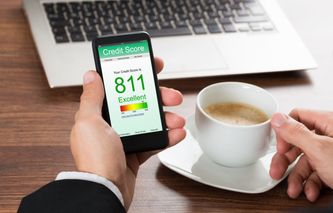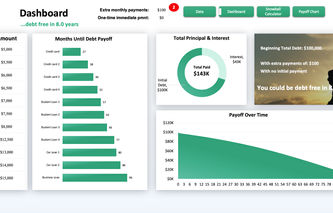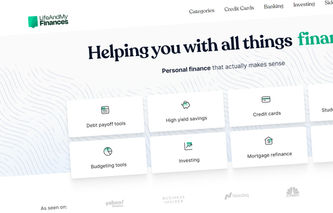You spend your teenage years dreaming of adulthood and then boom—you’re hit with credit checks, mortgages, loans, and a decent amount of debt if you’re lucky.
Sounds pretty overwhelming at first. But once you learn the ropes, you’ll be mastering the art of being an adult in no time.
This article will tell you—
The importance of having good credit.
The best ways to build credit at 18.
The fastest way to build credit.
How to build credit with no credit history.
Similar articles:
How to Start Building Credit at 18: Best Ways to Start Building Credit Fast
So you’re young, fun, and still living with your mom. Why do you need to start learning how to build credit at 18?
If you’ve ever had a bad grade in school, you’ll know the feeling of wishing you had just started studying earlier rather than half-asleep the night before.
Credit isn’t so different. And if those late nights have taught you anything, it’s that time flies—so being prepared can really help you out in the future.
Here’s everything your future self will thank you for when you build up your credit—
Better insurance rates.
Lower interest rates for loans.
More credit card options.
Better housing options.
Greater negotiating power.
Bragging rights.
Now that we have your attention, let's find out how to build credit with no credit history—
How to Build Credit at 18
The first step in learning how to build your credit at 18 is understanding where your credit comes from.
Many lenders and financial experts use the FICO score to get a better understanding of an individual's creditworthiness.
FICO divides your credit score into five categories:
Excellent: 800–850
Very Good: 740–799
Good: 670–739
Fair: 580–669
Poor: 300–579
And what contributes to your credit score?
Here’s a breakdown of the different credit score factors:
Payment history: 35%
Amount owed: 30%
Credit history length: 15%
Credit mix: 10%
New credit: 10%
Be sure to keep all these in mind as you learn how to establish credit for the first time. And if you’re not sure how to apply all these stats and facts, get ready for the complete run-down.
Best Ways to Build Credit at 18
Here are the key steps to follow if you want to learn how to start building your credit—
Keep track of your credit score
Even if you’ve been avoiding that less-than-impressive credit score for a while, it’s time to put it under the microscope.
By keeping tabs on your credit score, you can build good financial habits by seeing exactly where you need to improve and how you can achieve your targets.
And if there’s any shady activity happening on your account, you can spot it by checking your statements and transactions.
A study by the Federal Trade Commission also found that one in five consumers found errors in their credit reports which could affect their scores. So take the blame off your shoulders and keep an eye out for any slip-ups.
Check out Credit Karma’s free monitoring service, where you can stay up to date with any changes, and get notifications for any suspicious activity.
TransUnion also offers a paid credit monitoring subscription, which gives you—
Unlimited score and report access.
Email updates and alerts.
Personalized debt analysis.
Access to ID theft experts.
Up to $1 million ID theft insurance.
Get a job
We get it. You’re barely out of school and now you’re reading about credit scores and contemplating your future career (with a slight existential crisis thrown in there).
The good news is that you’re still young enough to figure out the world of adulthood. But unless your last name is Kardashian, joining the workforce is closer than you think.
To be clear—your employment status doesn’t affect your credit score. But it can open doors as you’re learning how to build your credit.
Lenders tend to look at your employment history and income when giving out loans, credit cards, and mortgages—all of which are smart ways to build credit at 18 (more on that later).
Need some career inspiration?
Here are the top jobs and salaries in consumer services and the energy industry.
Become an authorized user
We don’t normally encourage jumping on the back of others’ success to get a leg up. But in this case, we might need to make an exception.
Life isn’t a game of Uno where you can swap your cards for someone else’s—but you can join forces.
Many credit card companies let their main cardholders add another person as an authorized user. Not only does this allow you to make purchases on their card (take it easy), but you can also benefit from their credit activity as it’s reported to the credit bureaus.
But just like in Uno, you have to be careful which player’s cards you choose. If someone has poor credit, this will negatively impact your own score.
So before you seal the deal—make sure this person is trustworthy and has a good credit history. Your safest bet is usually a family member or a close friend (just not the ones who would choose a weekend bender over paying rent).
Choose the right credit card
Putting your credit into someone else’s hands can be risky. So if becoming an authorized user isn’t for you, why not open your own credit card?
I know what you’re thinking—getting a credit card with no credit is like running a marathon after partying all night. But there are loopholes that can give you a much-needed boost.
Unlike standard credit cards, secured cards tend to be more open to accepting those with little to no credit. They ask for a lump sum of cash instead, to act as collateral in case you fail to make payments.
The catch is that secured cards typically come with higher interest rates and fewer rewards—but think of these as a stepping stone to getting a better credit card.
If a secured card isn’t for you, there are also a bunch of unsecured cards that can help you increase your credit score.
Here are some of the best credit cards for credit building with poor credit:
Check out the best unsecured credit cards for our complete rundown.
Keep your credit utilization low
To keep that credit score in check, you should aim to keep your credit utilization rate below 30%.
Your credit utilization rate is your overall amount of revolving balance divided by the total amount of credit you have available.
For example, one card has a revolving balance of $200 and a limit of $1,000—and your other card has a balance of $150 and a $600 limit. This means you have a total $350 revolving balance and a $1,600 credit limit.
Divide $350 by $1,600—and you’re left with a credit utilization rate of 21.8%.
To keep your utilization down and maintain a good credit score, you can pay off your balances on time, reduce spending, and increase your credit limit.
Get credit for payments
If you thought the only good things to come from spending were food, new clothes, and a sunburnt nose after a trip to Hawaii—you’d be wrong.
While splurging too much can damage your credit score, responsible spending is actually one of the best ways to establish credit.
This includes making payments on—
Utility bills
Loan repayments
Phone bills
Rent
Credit card payments
Many of these payments are reported to the credit bureaus, which can help raise your credit score. And if you need a helping hand, there are a bunch of programs and services that can teach you the best ways to start building credit.
Experian Boost is a free service that can show you how to build credit with no credit. All you need to do is connect your bank or credit card, and they’ll add your bill payments to your credit file.
The bills covered include—
Phone or landline
Internet
Gas and electricity
Water
Cable and satellite
Make on-time payments
If you’re all set to pay those bills, you have to do it the right way. One key thing you need to know about how to get credit is that you need to make on-time payments.
As we said, your payment history makes up 35% of your overall credit score.
The credit bureaus aren’t judging you on your excessive shoe-shopping habit—but they are paying attention to whether or not you’re making punctual payments.
Whether it’s your phone bill or the dreaded heating bill in winter—if you pay on time, you stand a good chance of boosting your credit as you’re showing financial responsibility.
If you’re like me and forget your door keys immediately after popping outside in your pajamas—set reminders or automated payments so you never miss a beat.
When it comes to paying rent, many landlords can’t (or won’t) report your payments to the credit bureaus. In that case, Rent Reporters are on hand to report your rent for you, which they say can help increase your credit score in as little as ten days.

Lay out your credit card debt with the minimum payments and interest to see how long it will take to pay off!
What you will get:
Interactive dashboard
Customizable to your needs
Stay on track with charts and graphs
Suitable for up to 16 or 32 debts!

Take out a loan
We won’t beat around the bush, taking out a loan can be risky—especially if you’re struggling to make the repayments, as this can seriously damage your credit score.
But if you need the cash (and you’re confident you’ll be able to pay everything back), making on-time loan repayments is one of the best ways to build your credit.
If you plan on going to college, you could also take out a student loan, which you’ll need to pay back in installments.
The student loan will be linked to your credit score, even if your parents are signed as guarantors or cosigners—as long as the loan is in your name.
Make smart choices
If you’ve managed to get your hands on a credit card, handle it with care. (Just imagine it’s a big box filled with tiny kittens and a big “Fragile” label stamped across it.)
We’re not trying to scare you away, but if you’re learning how to establish credit at 18, you need to start building up good financial habits that will hopefully last you a lifetime.
Try not to spend beyond your means. Having a monthly budget can help you stay on top of your finances while making on-time payments. It could also keep you out of debt (which never looks good on your credit report).
If you want to start building credit from no credit, you should also keep an eye out for credit cards that accept those with bad credit scores. Eventually, you’ll have enough credit to move onto a better card with more perks.
What’s the Fastest Way to Build Credit at 18?
One of the best ways to learn how to build credit fast with no credit is to pay off your bills and make on-time payments.
Your payment history accounts for the majority of your credit score. This should be the main factor to focus on if you want to find easy ways to build credit.
Your payment history includes:
Credit card payments
Personal loans
Mortgage loans
Retail accounts
Finance company accounts
Marc Andre, the founder of VitalDollar.com, also highlights the importance of being smart with your credit card,
I recommend that young adults have a card with a low credit limit and that they use it at least once a month for necessities. You don't need to charge a lot, but using a credit card and making consistent payments each month helps to establish that you're reliable with paying on time.
The founder of VitalDollar.com
How to Build Credit From Scratch?
Building credit for beginners isn’t the big bad wolf you might have imagined in your head. It can be more like having cookies with a sweet old grandmother if you play your cards right.
To sum up
Our top tactics on how to build credit with no credit history include—
Understanding and tracking your credit score.
Making on-time payments.
Becoming an authorized user.
Choosing the right card for you.
Using your credit card wisely.
And since you’ve got youth on your side, there’s no need to bulldoze through our list and try everything at once.
As the saying goes, slow and steady wins the race—so take your time and see which strategy works best for you.


.jpg)



